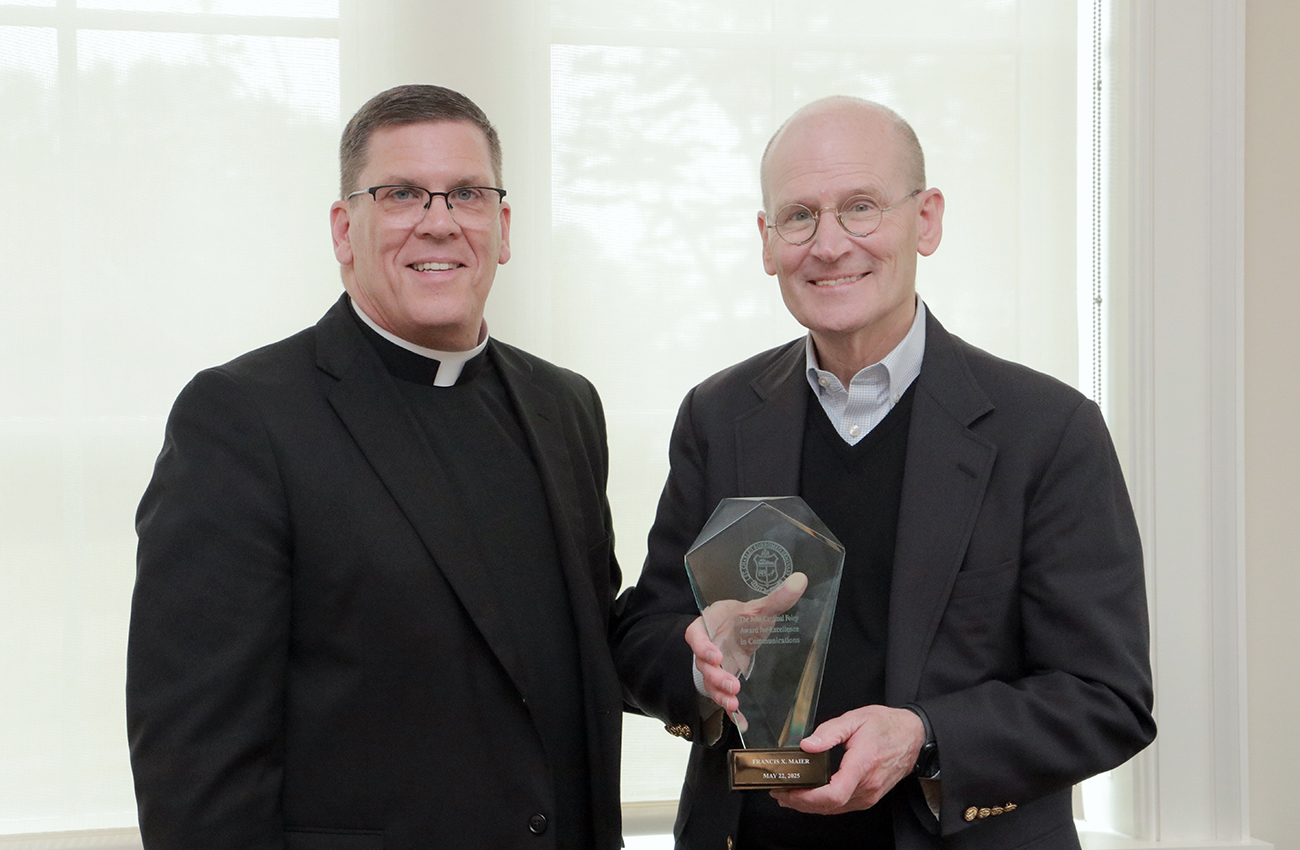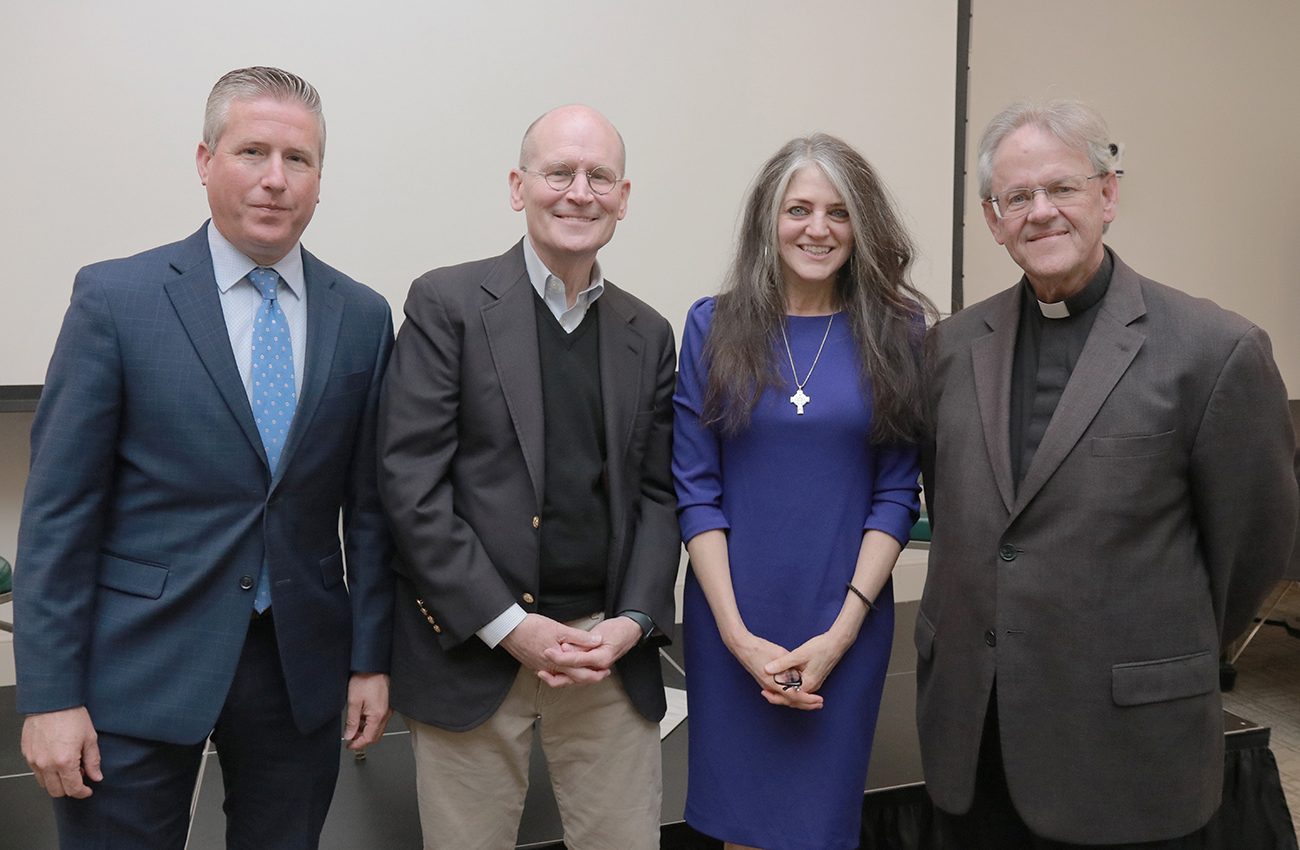A longtime Philadelphia news reporter, a veteran Catholic journalist, and the senior aide to Philadelphia’s retired archbishop told of their reasons to share hope within the news we see every day.
The annual John Cardinal Foley Symposium held May 22 at St. Charles Borromeo Seminary welcomed Joe Holden, chief investigative reporter for CBS3 in Philadelphia; Gina Christian, national reporter for the Catholic newspaper Our Sunday Visitor; and Fran Maier, senior fellow at the Ethics & Public Policy Center and former adviser to Archbishop Charles Chaput, who retired in 2020.
>>>SEE RELATED: Seminary Hosts Annual Cardinal Foley Symposium
Maier also received the 2025 John Cardinal Foley Award recognizing the excellence of a communications professional who works in the media.

Father Christopher Redcay, new Rector of St. Charles Borromeo Seminary, presents Fran Maier with the 2025 John Cardinal Foley Award. (Photo: Sarah Webb)
The symposium came in advance of the universal Church’s World Communications Day celebrated June 1. Earlier this year the late Pope Francis shared the 2025 message for the day, one imbued with the 2025 Jubilee Year theme: “Share with gentleness the hope that is in your hearts.”
Holden, a graduate of Msgr. Bonner High School and Cabrini College, talked about how amidst the longtime trends of local news to focus on hard and often negative news, the stories that bring hope are the ones that bring the greatest impact.
He cited the example of a man he personally took care of while at Bonner, the late Augustinian Father Bill Atkinson. The quadriplegic priest’s cause for sainthood gained momentum after AnneMarie Dolceamore’s cancer battle in 2020, one which she says led to a miracle from Father Atkinson.
“They can’t explain it, and so she is now one of the leading cases for consideration for his potential sainthood. We started the story about her, and it is such an honor to talk about Father Bill, because he would give me such a grin about all of the attention that this is getting,” Holden said.
“It’s just the most random ways sometimes people find us with their stories, and it really is such an honor to tell them. Those are the stories that make me want to get back in my car every morning and go find that next hope-filled story.”
Christian, formerly a senior producer for CatholicPhilly, has focused much of her reporting and commentaries in recent years on the Russia-Ukraine war. Ukraine is a place where hope and devastation have resided hand in hand, she said, since Russia’s invasion in 2022.
“My experience of Catholic journalism has been discerning Jesus Christ at work, especially in the most horrific circumstances,” said Christian, who cited a recent story she filed from Zaporizhzhia, Ukraine – just 20 miles from Russian troops.
She observed three religious sisters regularly go out to the front lines to deliver aid to soldiers and to villagers who cannot leave their villages.
“They have survived attacks that almost killed them,” Christian said. “But they still go out, and they still fight, and they deal with some of the worst questions that a human being can ever face.”
The sisters rely on a source of divine help, Christian said, to “get up despite a night of no sleep due to air raids and go out to the villages with their little bulletproof vests, these nuns in long, full traditional habits (with) their packages, food, supplies for just basic human needs, and above all their words of hope and their witness.”
Maier, who worked as senior adviser and special assistant to Archbishop Chaput for 23 years in Denver and Philadelphia, placed the virtue of hope in context.
“Hope is almost always associated with the overcoming of some form of suffering, the assertion of the good in the world in the face of setbacks, failures, and sufferings,” he said. “Of course, that’s the business of the Church, isn’t it?”
An author and former editor in chief of the National Catholic Register, Maier emphasized communicating hope through the Church – particularly in the area of preaching and writing homilies.
The study of Catholic preaching is a particular focus of the seminary’s John Cardinal Foley Chair of Homiletics and Social Communications, led by Oblate Father Thomas Dailey.
“Homiletics is absolutely crucial, because people are not finally converted by doctrines and absolute ideas. They’re converted by other people in the environment. We can communicate (with) them through a sense of a good future and a loving hand,” said Maier.
“Communication has to be more than a damage control unit. It has to be a creation of what we’ve been talking about here, that the Church has a message of hope, that there is a supernatural reality. The problems that we’ve got now have replicas in previous centuries, and we’ve come through them all.”
Those problems range from the closing of multiple hospitals in Delaware County to the devastation from war half a world away. Yet the three communicators uncover the hope for God – whether subtly or in apparent ways – in the stories they tell.
“It is the only reason why we were able to cover that hospital story like we did, because an entire workforce started to believe that we really were trying to do break down walls and try to make a difference,” Holden said.
“I’m still seeking hope in all of my stories because I have to find a way through the nasty stuff that we’re dealing with.”
“We’re all communicators, whether we have social media accounts or jobs in communications or not,” said Christian, recalling a saying: “They’re not reading the Bible, they’re reading you as Christians.
“We just go out and live it and live hope; live Jesus,” she said.
PREVIOUS: CRS Urges U.S. Funding to Resume for At Risk Children, Families Abroad
NEXT: How Are You Hearing the Word? St. Charles Borromeo Seminary Wants to Know



Share this story